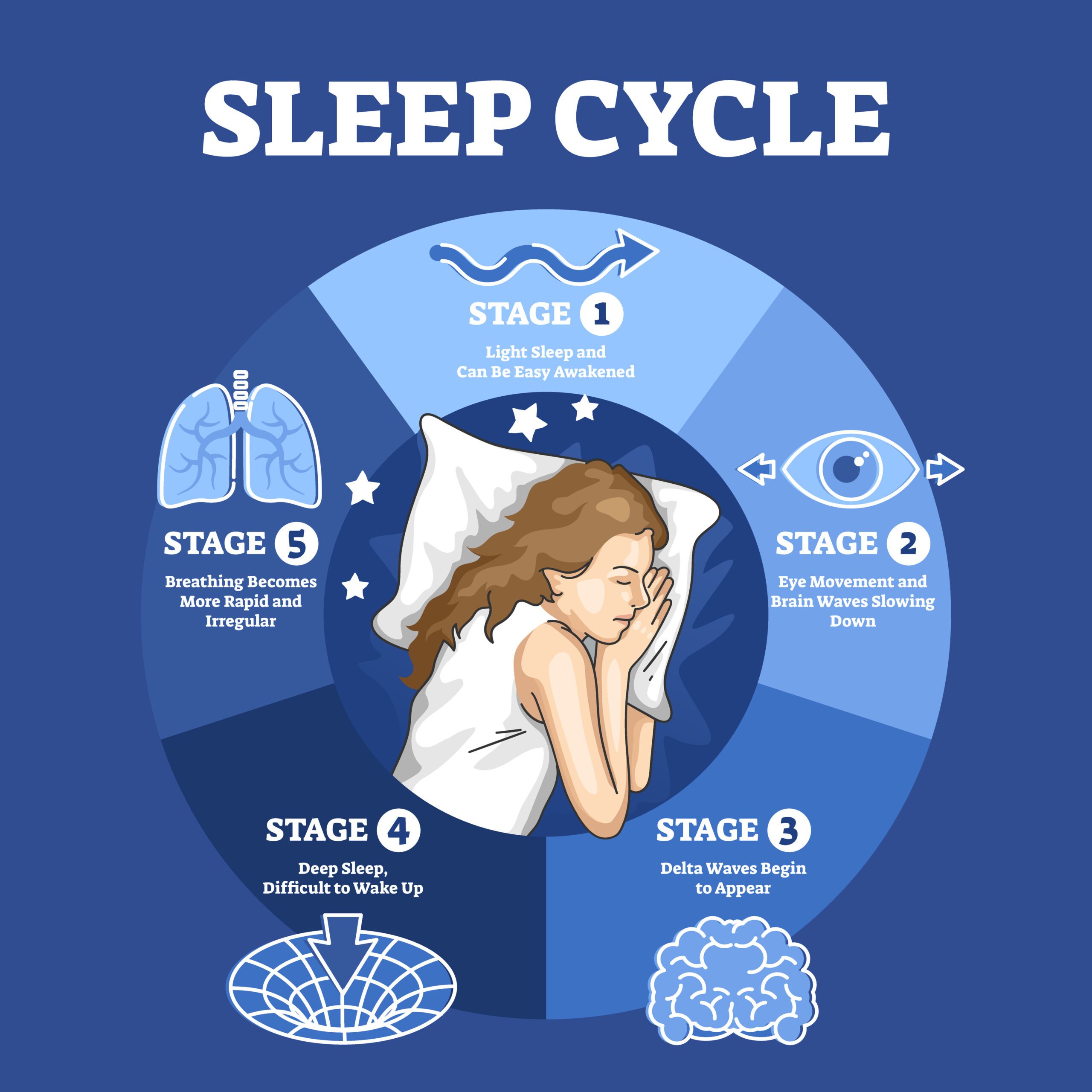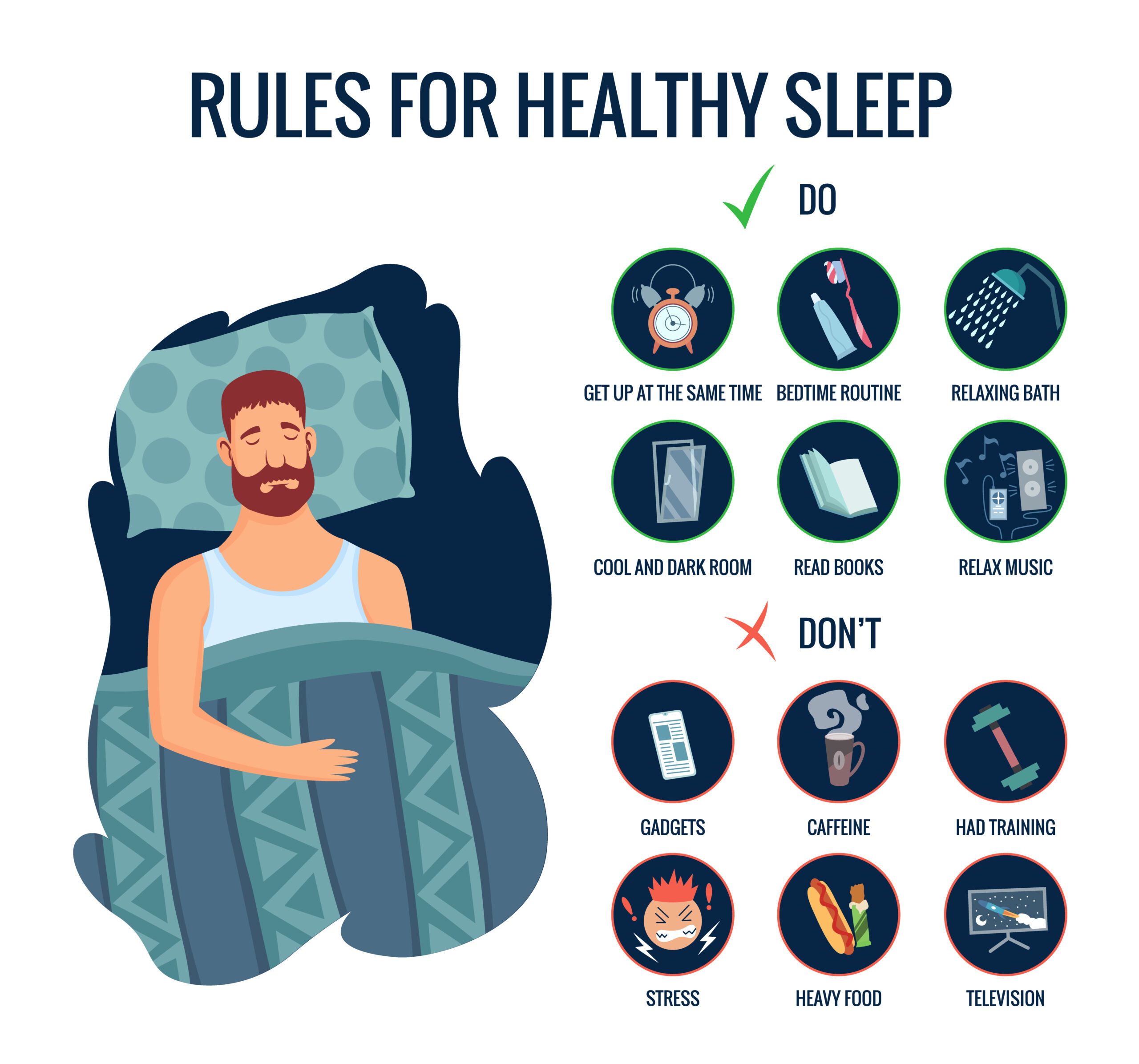The Role of Sleep in Weight Loss: Uncovering the Nighttime Secret
December 28, 2023
 591
591 
In the quest for a healthier lifestyle and effective weight loss, we often focus on diet and exercise, the two pillars that dominate most fitness discussions.
However, there’s a third, critical component that frequently escapes our attention – sleep.
While we close our eyes each night, our body embarks on a complex journey of restoration and balance, processes that are crucial not just for our overall well-being but also for our ability to manage weight effectively.
Sleep, an essential yet often neglected aspect of health, plays a pivotal role in regulating metabolism, appetite, and energy expenditure.
It’s during those quiet hours of rest that our body fine-tunes the intricate mechanisms influencing weight control.
The quality and duration of our sleep can have profound effects, often unseen and underestimated, on our weight loss journey.
In the following sections, we will delve into how sleep, an activity that occupies about a third of our lives, is not just a passive state but an active ally in our pursuit of a healthier weight.
From hormonal balance to decision-making processes, understanding the symbiotic relationship between sleep and weight management could be the key to unlocking a more effective and holistic approach to weight loss.

When we skim on sleep, we often unknowingly set the stage for an uphill battle in managing our weight.
The connection between insufficient sleep and weight gain is more than just feeling groggy and reaching for that extra cup of coffee.
It’s a complex interplay of hormones and metabolic processes.
A key aspect of this connection lies in the realm of two hormones: Ghrelin and Leptin. Ghrelin, often dubbed the ‘hunger hormone,’ signals to our brain that it’s time to eat.
On the other hand, Leptin, the ‘satiety hormone,’ sends cues of fullness and satisfaction.
When we’re well-rested, these hormones maintain a harmonious balance, helping regulate our appetite effectively.
However, the plot thickens with sleep deprivation. Lack of sleep triggers an increase in Ghrelin levels while simultaneously decreasing Leptin.
This hormonal imbalance leads to increased hunger and appetite, often coupled with cravings for high-calorie, sugary, and fatty foods.
It’s like having a mischievous duo steering your dietary choices, making it challenging to adhere to healthy eating habits.
Another layer to this story is how poor sleep impacts our metabolism.
Metabolism, in simple terms, is the engine that burns the calories we consume. Adequate sleep keeps this engine running efficiently.
However, when we compromise on sleep, our body, perceiving this as a stress signal, shifts into energy conservation mode.
This change means a slower metabolic rate, not unlike a car shifting to a lower gear.
This metabolic downshift has a two-fold effect.
Firstly, it reduces the number of calories we burn at rest, and secondly, it can affect our energy levels and motivation to engage in physical activity.
The result? A double-edged sword where not only do we tend to eat more, but we also burn fewer calories, creating a challenging environment for weight loss.
Understanding this sleep-weight loss connection is vital in shaping a holistic approach to weight management.
It’s not just about what we eat or how much we exercise, but also about ensuring our body gets the restorative sleep it needs to keep these complex systems in balance.

Understanding sleep’s role in weight loss requires a closer look at the stages of sleep – a nightly cycle that plays a critical role in our physical health.
Sleep is not a uniform state; it’s a dynamic process comprising various stages, each with its unique functions and impacts on our body’s weight management mechanisms.
Sleep is broadly categorized into two types: Rapid Eye Movement (REM) and Non-Rapid Eye Movement (Non-REM) sleep.
Non-REM sleep includes three stages, ranging from light sleep (stages 1 and 2) to deep sleep (stage 3).
REM sleep, often associated with vivid dreaming, is a deeper, more restorative phase.
During the Non-REM stages, especially deep sleep, our body undergoes significant repair and recovery processes.
This phase is crucial for physical restoration, as it’s when the body repairs tissues, builds bone and muscle, and strengthens the immune system.
The release of growth hormone during deep sleep is particularly important for these processes.
Deep sleep, the most restorative phase, plays a pivotal role in muscle repair and recovery.
This is crucial for those engaged in regular exercise as part of their weight loss journey.
Efficient muscle repair not only aids in building lean muscle mass, which in turn increases metabolic rate, but it also ensures that you have the energy and physical readiness for your next workout.
Moreover, deep sleep’s role in metabolism extends beyond muscle repair.
It’s during this phase that the body optimizes the use of energy sources, balancing the use of stored fats and carbohydrates.
This optimization is key in maintaining a healthy weight, as it influences how the body stores and uses energy from food.
The connection between sleep stages and weight management is profound. While REM sleep revitalizes the mind, Non-REM, particularly deep sleep, rejuvenates the body.
Ensuring a healthy balance of these sleep stages not only supports physical recovery and energy balance but also plays an integral role in the effective management of weight.

In the intricate dance of health and wellness, sleep deprivation steps in as a significant disruptor, often leading us down a path of weight gain and unhealthy habits.
This relationship between insufficient sleep and weight gain is not just physiological; it’s a complex interplay of behavioral and psychological factors.
One of the immediate consequences of not getting enough sleep is its impact on our food choices.
When we’re tired, our body craves quick energy fixes, leading us to reach for foods high in sugar and fat.
These cravings are more than just a lack of willpower; they’re a direct result of our brain seeking the quickest way to replenish energy.
Moreover, sleep deprivation impairs our decision-making abilities and impulse control.
When operating on less sleep, our prefrontal cortex – the brain region responsible for logical thinking and decision-making – doesn’t function at its best.
This impairment can lead to poor dietary choices, favoring convenience and comfort over nutritional value, which inevitably contributes to weight gain.
The effects of sleep deprivation extend beyond just eating habits.
When you’re running low on sleep, energy levels plummet, and the motivation to engage in physical activity takes a hit.
This lack of energy not only reduces the likelihood of participating in regular exercise but can also lead to more sedentary behaviors throughout the day.
As physical activity decreases, so does the body’s calorie-burning efficiency, further contributing to weight gain.
Sleep deprivation is closely linked to increased stress levels.
The body’s stress response, involving hormones like cortisol, can be exacerbated by lack of sleep.
Elevated cortisol levels not only contribute to weight gain (especially around the abdomen) but also make it harder to shed those extra pounds.
Stress and sleep form a two-way street; poor sleep can increase stress, while high stress can make it harder to get a good night’s rest.
This cycle can be particularly detrimental to weight loss efforts as it not only influences our habits and choices but also directly affects our body’s physiological processes.
Breaking out of this cycle of sleep deprivation, poor eating choices, reduced activity, and increased stress is crucial for effective weight management.
Understanding the multifaceted relationship between sleep and weight is the first step towards disrupting this cycle and paving the way for healthier lifestyle choices.

In the quest for better sleep, and consequently, effective weight management, cannabinoids – the natural compounds found in the cannabis plant – have emerged as a promising solution.
However, when discussing cannabinoids for sleep, it’s crucial to focus on the non-psychoactive varieties, primarily CBD (Cannabidiol) and CBN (Cannabinol), which do not produce the ‘high’ associated with THC.
CBD has gained significant attention for its potential to improve sleep quality.
Unlike THC, CBD does not produce psychoactive effects, making it an appealing option for those seeking natural sleep aids.
Research suggests that CBD may help with sleep because of its ability to address the root causes of insomnia, such as anxiety and stress.
A study published in The Permanente Journal noted that anxiety scores decreased in more than 70% of participants, which subsequently improved their sleep scores.
CBN, a less known cannabinoid, is also showing promise as a sleep aid.
Though research on CBN is still in its early stages, preliminary studies suggest that it may have sedative properties.
This effect is particularly notable when CBN is combined with CBD, enhancing its sleep-inducing benefits without the psychoactive effects of THC.
The body of research exploring the link between cannabinoids and sleep enhancement is growing.
One such study, published in the Journal of Clinical Pharmacology, found that CBD might improve sleep in individuals with insomnia.
Another research in the Journal of Alternative and Complementary Medicine pointed to the potential of CBD in improving sleep and reducing anxiety.
It’s important to note that while these findings are encouraging, more extensive research is needed to fully understand the sleep-enhancing properties of cannabinoids like CBD and CBN.
Furthermore, the response to these compounds can be highly individualistic, and what works for one person may not be as effective for another.
For those struggling with sleep issues that impact weight loss efforts, exploring CBD and CBN as part of their sleep hygiene routine could offer a natural alternative to traditional sleep aids.
These cannabinoids, known for their potential to improve sleep quality and duration, could be a valuable tool in enhancing overall health and aiding in weight management.

Achieving better sleep and, by extension, more effective weight management, involves more than just understanding the science.
It requires actionable strategies that can be integrated into daily routines.
Here are practical tips to enhance your sleep quality, which can have a positive ripple effect on your weight loss journey.
Implementing these tips can lead to improved sleep quality, which is a crucial, often underrated factor in weight management.
By enhancing your sleep, you not only support your body’s physical health but also equip it better to embark on a successful weight loss journey.
As we conclude our exploration of the intricate relationship between sleep and weight management, it’s clear that sleep is not just a passive state of rest, but a dynamic and influential factor in our health and wellness journey.
The key takeaways from our discussion highlight the profound impact that quality sleep can have on weight loss and overall well-being.
As we’ve seen, sleep is a powerful ally in the quest for weight loss and better health.
It’s an integral component that deserves as much attention as diet and exercise.
I encourage you to view sleep not as an optional luxury, but as a foundational pillar in your health regimen.
By prioritizing and improving your sleep, you’re setting the stage for more effective and sustainable weight management.
Here’s to healthier nights and brighter days on your journey to wellness!

A new study suggests that a widely used sugar substitute found in diet sodas, chewing gum, and low-sugar yogurt may elevate insulin levels. This could increase the long-term risk of heart disease. “Artificial sweeteners have infiltrated nearly all types of food, making it crucial to understand their long-term health effects,” said Yihai Cao, senior author […]

Diet Coke has long been a fan-favorite among soda lovers who want a fizzy, guilt-free alternative to traditional soft drinks. While its zero-calorie, zero-sugar label makes it seem like a healthier option, the reality is far more concerning. Despite its undeniable popularity, Diet Coke’s nutritional profile has raised red flags among health experts for years. […]

New study shows that embracing an anti-inflammatory, plant-forward diet can support cognitive function and help reduce the risk of dementia. What You Eat Shapes Your Brain The food you eat doesn’t just impact your body—it also affects your brain. Research suggests that eating an anti-inflammatory, plant-based diet can help improve memory, focus, and overall brain […]